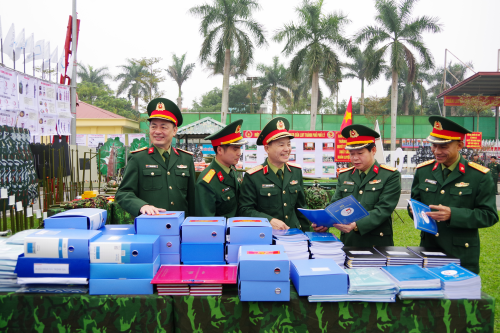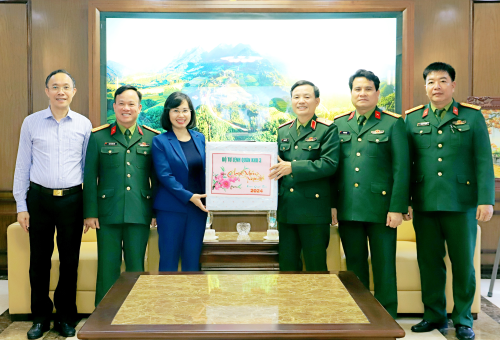Military Region 3 raises the quality of logistics work under Resolution 1658-NQ/QUTW
According to Resolution 1658-NQ/QUTW, dated 20 December 2022, by the Central Military Commission (CMC) on military logistics work, we must “be self-reliant,… achieve an all-round, synchronous, solid reform and development, unceasingly improve logistics potential and postures, readily undertake and successfully fulfil all tasks in any circumstances”. Grasping the Resolution, Military Region 3’s Party Committee and Command have focused on taking various measures to raise the quality of this important work.
Logistics work is an important part of military - defence work, contributing to creating the Military’s synergy and combat readiness. After the issuance of the CMC’s Resolution 1658-NQ/QUTW, dated 20 December 2022, on “military logistics work towards 2030 and beyond”, the Military Region Party Committee has developed an action plan for this Resolution with feasible targets, specific tasks, effective measures, and detailed road map appropriate to the particularities of the Military Region’s armed forces. At the same time, it has directed offices and units to grasp and concretise the Resolution into their action plans/programs.
 |
| Logistics support provided for the kick-off ceremony of the training season of 2024 within the Military Region |
In the past 2 years of executing the Resolution, the Military Region has made a positive change in its logistics work, as a result of its great political responsibility and resolve. The logistics sector’s organisational structure from unit to Military Region levels has been consolidated. The quality of logistics support has continued to improve, while troops’ life and health have been well maintained. The Military Region’s logistics sector has proactively mobilised and opportunely, sufficiently provided resources for both regular and irregular tasks. Preparations and logistics support for combat readiness, training, exercises, contests, natural disaster prevention and control, search and rescue have been renewed. Logistics potential and postures of the Military Region and localities, especially in border, sea, island, remote, isolated, key areas have been developed. Notably, the Military Region’s logistics sector closely coordinated with other forces to take part in Military Region 3’s Defensive Combat Exercise, which was highly appreciated by higher echelons.
Currently and in the upcoming time, armed conflicts around the world will continue to disrupt global supply chains, profoundly, comprehensively impacting on many countries. Domestically, climate change, natural disasters, and epidemics will be still complex; Storm No.3 (aka Yagi) has recently caused huge losses in human lives and property as a typical example. New, higher requirements will be imposed on Army building and Fatherland protection. The Military Region’s armed forces will perform various tasks, leading to a growing demand for logistics support; meanwhile, logistics and technical offices within the Military Region will be merged with one another, greatly impacting on logistics work. Against this backdrop, the Military Region’s Party Committee and Command will continue to grasp and implement Resolution 1658-NQ/QUTW to further improve the quality of logistics work, meeting the requirements of military - defence tasks in all situations.
First, enhancing all-level party committees and commands’ leadership and direction over logistics work. The Military Region will require all-level party committees and commands to thoroughly grasp Resolution 1658-NQ/QUTW and directives and plans on logistics work by the Ministry of National Defence and the Military Region itself. All-level party committees and commands must be cognisant of the importance of logistics work, while heightening a sense of responsibility for their leadership and direction over this work. In the medium term, the Military Region will direct all-level logistics offices and units to focus on accomplishing all logistics tasks and targets of 2024. Logistics offices and units must be proactive in situational assessment to help party committees and commands adjust and supplement targets and measures for the Resolution in 2025 in a highly feasible way. Great value should be attached to achieving breakthroughs and comprehensive positive changes in units’ performance of logistics work. More importantly, logistics support should be more effectively provided for combat readiness, natural disaster prevention and control, search and rescue; measures to raise the quality of catering and troop health should be drastically implemented. To that end, the Military Region will direct all-level logistics - technical offices to closely align the implementation of the CMC’s resolutions on logistics and technical work with the Determined to Win Emulation Movement and the movement titled “Military Logistics Sector follows Uncle Ho’s teachings”. Moreover, the Military Region will step up the building of role models in logistics work, while intensifying inspection and supervision to opportunely detect and rectify shortcomings in this work at all levels.
Second, concentrating on building comprehensively strong logistics offices and units capable of meeting their task requirements in the new situation. Advocating the CMC’s standpoint on self-reliance in logistics work, the Military Region will focus its leadership on merging its Logistics Department and Technical Department into Logistics - Technical Department in the fourth quarter of 2024 in a serious, close manner. In addition to force adjustments, the Military Region will require party committees and commands of offices and units to continue to supplement and complete regulations on logistics - technical work, enhance the decentralisation of this work, delegate specific responsibilities and authority to each speciality and each commander of affiliated units. At the same time, the Military Region will promote political and ideological education to raise awareness, a sense of responsibility, and service attitude among cadres, employees, and soldiers, while intensifying inspection, grasping the situation, and opportunely settling drawbacks to further improve the task performance of logistics - technical offices at all levels.
 |
| Leader of the Military Region visits and gives presents to a locality |
Third, achieving breakthroughs in the improved quality and effectiveness of routine logistics support, particularly for troops’ health and life. This is a consistent goal of logistics work defined by the CMC in Resolution 1658-NQ/QUTW. Therefore, while concentrating its leadership over logistics support for combat readiness, the Military Region will direct its offices and units, particularly the logistics sector to drastically implement measures to raise the quality of logistics support, especially for catering and troop health. Offices and units will be required to frequently render their logistics cadres, soldiers, and employees fully aware of the Party’s viewpoints on “industriousness, thrift, integrity, uprightness, public-spiritedness, selflessness, and living a pure, healthy life”. To that end, in addition to effectively exploiting resources for logistics work, units across the Military Region will continue to combine economic development with national defence, fostering crop and animal husbandry in a focalised, closed, sustainable, proper fashion, actively applying scientific and technological advances to raise productivity and product quality, closely aligning production with processing under Project “QN-21”, building “units good at catering and ordnance management”.
In troop health protection and care, barracks management, petroleum, and transport work, the Military Region will continue to focus its direction on realising the targets of the emulation movements, namely “building five-good military medical units”, “building and managing regular, bright, green, clean, beautiful barracks”, “managing and using petroleum safely, economically, effectively”, and “building regular, safe, efficient transport units”. Emphasis will be placed on making the preventive medicine system capable of dealing with medium- and small-scale epidemics. The Military Region will actively mobilise resources to acquire equipment and improve the professional competence of its medical force, ensuring its troops’ fitness, achieving a high rate of healthy troops (more than 98.8%). It will well conduct and manage barracks planning, maintain structures within barracks, and strive to complete the building of barracks of units which will not experience merger or transference. Due attention will be paid to closely managing and properly allocating petroleum for tasks of the Military Region’s armed forces, while realising the target of saving 10% petroleum and electricity consumption as a contribution to fostering the movement on practising thrift and fighting wastefulness. The Military Region will improve the capacity of its transport units, particularly its water transport ones, well maintain the technical coefficient of its vehicles, and flexibly apply methods of transport in a safe way to meet its task requirements.
Fourth, developing logistics potential and postures to satisfy the task requirements in all situations. Bringing into play the recorded results, in the upcoming time, the Military Region’s Party Committee and Command will continue to direct logistics offices and units to proactively cooperate with localities to develop and apply science and technology to logistics specialities, take part in appraising socio-economic development plans, especially for agriculture, health care, and transport, and give advice on promulgating policies for building and developing logistics potential and postures, with priority given to on-the-spot logistics support. The Military Region will direct provincial-level military commands to provide sound advice for local party committees and authorities and coordinate with local departments and sectors to foster socio-economic development, strengthen defence and security, build logistics potential and postures within defensive zones, consolidate and improve defensive zone supply councils, and build on-the-spot logistics force and logistics reserve force in accordance with the particularities of each area. Last but not least, the Military Region will continue to mobilise resources for constructing facilities and key works within its logistics - technical bases and provincial and district-level defensive zones’ logistics - technical bases in order to form an extensive, inter-connected, solid logistics posture capable of dealing with defence situations and meeting the task requirements of the Military Region’s armed forces in the new era.
Maj. Gen. LUONG VAN KIEM
Deputy Commander of the Military Region